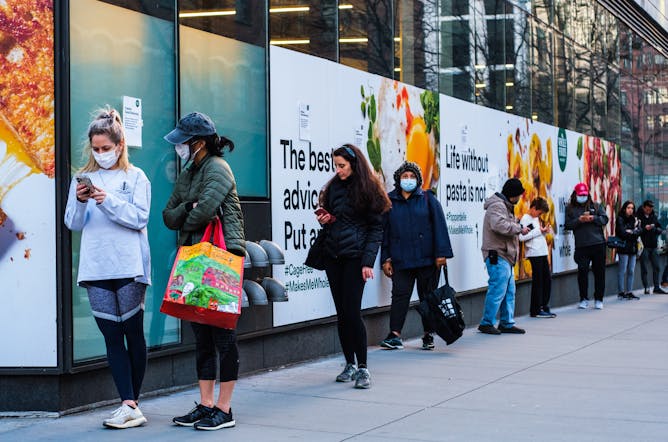|
|
|
|
The human mind has some serious limitations. Even when we believe we are thinking clearly, we are often irrational and emotional. Psychologists have identified more than a hundred cognitive biases – systematic errors in thinking – that we are prone to. As a result, many governments worried that their citizens could not be trusted to deal with a crisis as serious as a pandemic in a measured and thoughtful way – fearing society would descend into chaos.
But other research suggests this reasoning is flawed. How people respond to a crisis cannot be determined by the psychology of individual minds alone. For example, our decisions are also influenced by the information and funds we have access to. And as the pandemic has shown, people often develop a shared sense of identity with those around them at a time of crisis, staying calm and supporting each other rather than panicking.
The UK government's failure to understand the complex nature of human behaviour, blaming individuals instead of providing support and fostering community, may therefore ultimately have fuelled the pandemic.
In other news, it turns out that we have been measuring energy efficacy in homes all wrong. And a new study shows that it may be wise to start mixing the AstraZeneca and Pfizer vaccines.
Finally, apologies that this newsletter has been sent out late, due to a production glitch.
|
Miriam Frankel
Co-host, To the moon and beyond Podcast
|

|
|

People haven’t been as irrational during the pandemic as some initially thought.
Jennifer M. Mason/Shutterstock
Stephen Reicher, University of St Andrews
A society in crisis is more than the sum of its flawed parts.
|

Rawf8/Shutterstock
Freya Wise, The Open University
The ratings used to assess energy efficiency in homes throughout Europe are often inaccurate.
|

Johan Nilsson/TT/EPA-EFE
Tracy Hussell, University of Manchester
A study at the University of Oxford has looked at what happens when people receive one dose of AstraZeneca one dose of Pfizer.
|
Health + Medicine
|
-
Rob Reddick, The Conversation
South Africa now appears to have made a massive error in not rolling out AstraZeneca, while in the UK a study suggests a mix of vaccines may be the way forward.
|
|
Politics + Society
|
-
Andrea Janku, SOAS, University of London
As it celebrates it's 100th birthday, the Chinese ruling party's latest programme of education aims to harness the power of youth in its own interests.
-
Deirdre Shaw, University of Glasgow; Andreas Chatzidakis, Royal Holloway University of London; Michal Carrington, The University of Melbourne
How responsible are we for the slavery that is directly connected to our consumer choices and what can we do to reduce it?
-
Claire Pierson, University of Liverpool; Liza Caruana-Finkel, University of Liverpool
Worries about the potential repercussions of providing legal and accurate abortion care are endangering people’s health and lives
-
Katy Griggs, Nottingham Trent University
Athletes headed to Tokyo have trained throughout an unusually stressful year. Missing out on final preparations could hinder their chances at a medal
-
Chi Zhang, University of St Andrews
The current public discourse about Uyghur Muslims has become too politicised to benefit those who are said to be subject to forced labour.
-
Gemma Ware, The Conversation; Daniel Merino, The Conversation
Plus, what's happening in Chad, three months after rebels killed the president, Idriss Déby.
|
|
Science + Technology
|
-
Ashley Spindler, University of Hertfordshire
Machine learning is helping astronomers unravel the vast amounts of data being collected.
|
|
COVID-19
|
-
Mark Green, University of Liverpool
New research has shown that the impact of COVID in Greater Manchester is linked to socio-economic deprivation. The authors say their findings are replicable across the UK.
|
|
| |
Featured events
|

|
University House, Winston Churchill Avenue, Portsmouth, Hampshire, PO1 2UP, United Kingdom of Great Britain and Northern Ireland — University of Portsmouth
|

|
University of Leeds, Leeds, Leeds, LS2 9JT, United Kingdom of Great Britain and Northern Ireland — University of Leeds
|

|
Online Oxford Martin School Event, Online, Oxfordshire, N/A, United Kingdom of Great Britain and Northern Ireland — University of Oxford
|

|
University of Essex, Wivenhoe Park, Colchester, Essex, CO4 3SQ, United Kingdom of Great Britain and Northern Ireland — University of Essex
|
|
|
|
| |
| |
| |
| |
| |
|
|
|
|
|
|
|